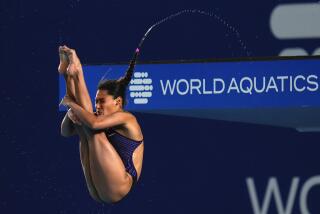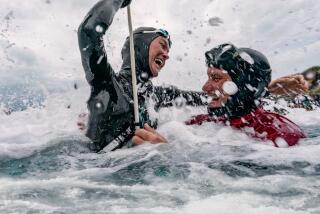Olympic Diver Louganis Reveals That He Has AIDS : Sports: The gold medalist says in a TV interview that he has had the virus since before the Seoul Games in 1988.
- Share via
Greg Louganis, considered the greatest competitive diver ever after becoming the only man to win gold medals in platform and springboard events at consecutive Olympics, revealed that he has AIDS in a television interview that will be broadcast Friday.
Louganis, 35, who won four gold medals at the 1984 and 1988 Summer Olympics, retired from the sport in 1988 and has been pursuing an acting career. He disclosed his homosexuality at the Gay Games in New York last summer.
In a transcript of the ABC “20/20” interview released Wednesday, Louganis said that “according to the CDC (Centers for Disease Control) standards of AIDS versus HIV, I do have AIDS,” and that he tested positive for the AIDS virus six months before the 1988 Games in Seoul after discovering that a former companion was dying of AIDS.
During preliminaries of the springboard competition, Louganis hit his head on the board while performing a complicated dive and began bleeding. A U.S. Olympic Committee doctor, who was unaware of Louganis’ condition and did not wear protective gloves, closed the two-inch gash with five stitches.
“I started coming out of the dive and then I heard this big hollow thud, and then I found myself in the water,” Louganis told ABC’s Barbara Walters. “I just held my head in hopes to, I didn’t know if I was cut or not, but I just wanted to hold the blood in, or just not (have) anybody touch it.”
At the time, Louganis and his coach, Ron O’Brien, were among only a few people who knew the diver had tested positive for the virus that causes AIDS. Louganis had not informed the USOC or U.S. diving officials.
“Dealing with HIV was really difficult for me because I felt like, God, the U.S. Olympic Committee needs to know this. (But) I didn’t anticipate hitting my head on the board. I didn’t anticipate, you know, blood. . . . That’s where I became paralyzed with fear.”
Louganis said he believed the chlorine and pool water would dilute, or kill, the virus, but he did not say anything to the physician attending him because “I was so stunned” and “you could throw the entire competition into a state of alarm.”
Dr. Leroy T. Walker, USOC president, said Wednesday that doctors who treated Louganis’ injury tested negative for HIV when the USOC later learned of the diver’s condition.
“Our doctors were exposed, but we tested them, and they are fine,” Walker said. “Greg was HIV-positive then, but, of course, we did not know that until very much later.”
AIDS experts said Wednesday that it was unlikely that Louganis could have transmitted the human immunodeficiency virus to anyone when he bled into the pool.
Doctors said the dilution of the virus in the water, combined with the effectiveness of chlorine in inactivating the virus, render the likelihood of transmission in any swimming pool extremely remote.
“It just doesn’t occur that way,” said Dr. Steven Miles, assistant professor of medicine at the UCLA Care Center, which does AIDS research and education.
After discussing with O’Brien the work he had put in to maintain his peak for the 1988 Olympics, Louganis decided to remain in the competition. He returned for the rest of the preliminaries and won the gold medal in the springboard competition the next day. He also went on to win gold in the platform event.
U.S. Olympic Committee spokesman Mike Moran said that since 1989, the USOC has instituted stringent rules for doctors, trainers and chiropractors to be followed whenever blood is spilled by an athlete in a U.S. delegation.
“This is a day I have dreaded for a long time,” said Louganis’ former coach, two-time Olympic gold medalist Dr. Sammy Lee. “Every time I see him, I look for the physical signs, but so far, thank God, they haven’t shown up yet.”
Louganis, then 15, trained and lived with Lee and his wife, Roz, in Huntington Beach for nine months while preparing for the 1976 Olympics.
“In ‘84, he told me that he was gay, a rumor I had been hearing for five years,” Lee said. “I told him then, ‘I love you like a second son. Did you think I was going to tell you to go away?’ Greg called me when Magic Johnson announced that he was HIV-positive and I thought for sure he was going to tell me then, but he didn’t. But every time I wrote him, I told him to get tested because if we knew ahead of time, we would be better able to help him.”
Louganis, who will begin a 13-city tour next week to promote his new book, “Breaking the Surface,” could not be reached for comment. He owns a home in Malibu, but has lived mostly in New York the last few years. O’Brien refused to comment because of his part in the book deal with Random House.
In the book, Louganis discusses childhood problems that include dyslexia, racism because of his Samoan complexion, an abusive stepfather, teen-age depression and three suicide attempts.
Mark Schubert, USC’s swimming coach, said he talked with Louganis a couple of months ago when he was in Los Angeles and worked out at the Olympic Diving Center.
“He seemed to be in good spirits,” Schubert said. “He said he was still diving to stay in shape, as well as for the fun of it.”
Born Jan. 29, 1960, to a Samoan father and a Northern European mother, both 15 at the time, he was adopted at 9 months by Peter Louganis, a bookkeeper who died of cancer in 1991, and his wife, Frances. He was their second adopted child.
He grew up in El Cajon, a middle-class suburb of San Diego and excelled in dance, gymnastics and acrobatic classes as a child. But bad knees forced him to give up those activities and, at age 12, a year after scoring a perfect 10 in the Amateur Athletic Union Junior Olympics, he began concentrating on diving.
Louganis began training on weekends with Lee and agreed to move in with him to train full time for the 1976 Olympics.
“I asked him if he wanted to be the youngest diver to win gold medals on both the springboard and platform and he said, ‘Yes,’ ” Lee said. “That’s when I told him he’d have to move in and train every day.”
Louganis was 16 when he won his first medal, a silver, at the 1976 Games in Montreal. He quickly developed into the premier diver in the country, winning a score of national titles at the University of Miami and then at UC Irvine, where he majored in drama.
He was a member of the 1980 Olympic squad but did not get to compete because of the U.S. boycott of the Moscow Games. Four years later in the Los Angeles Olympics, he dominated the competition, completing the first springboard-platform sweep in 56 years.
The boycott of the 1984 Games by Iron Curtain nations kept many athletes away from Los Angeles and may have left some question about the gold medal performances by Louganis. That convinced him to come back for the 1988 Games in Seoul. When the Seoul Games ended, he announced his retirement at 28.
Louganis was the only diver to score consecutive perfect 10s in an international competition. He also won five world championships, four Pan American championships and 48 national titles.
“He was unquestionably the greatest diver of all time,” Lee said. “Had he been a golfer or a tennis player with his record, he would’ve been a billionaire.”
Associated Press and Times staff writers Lon Eubanks, Julie Marquis and Gene Wojciechowski contributed to this story.
* LOW RISK (Orange County Edition): Experts say chance of transmitting HIV in pool is slim. A24
More to Read
Go beyond the scoreboard
Get the latest on L.A.'s teams in the daily Sports Report newsletter.
You may occasionally receive promotional content from the Los Angeles Times.






